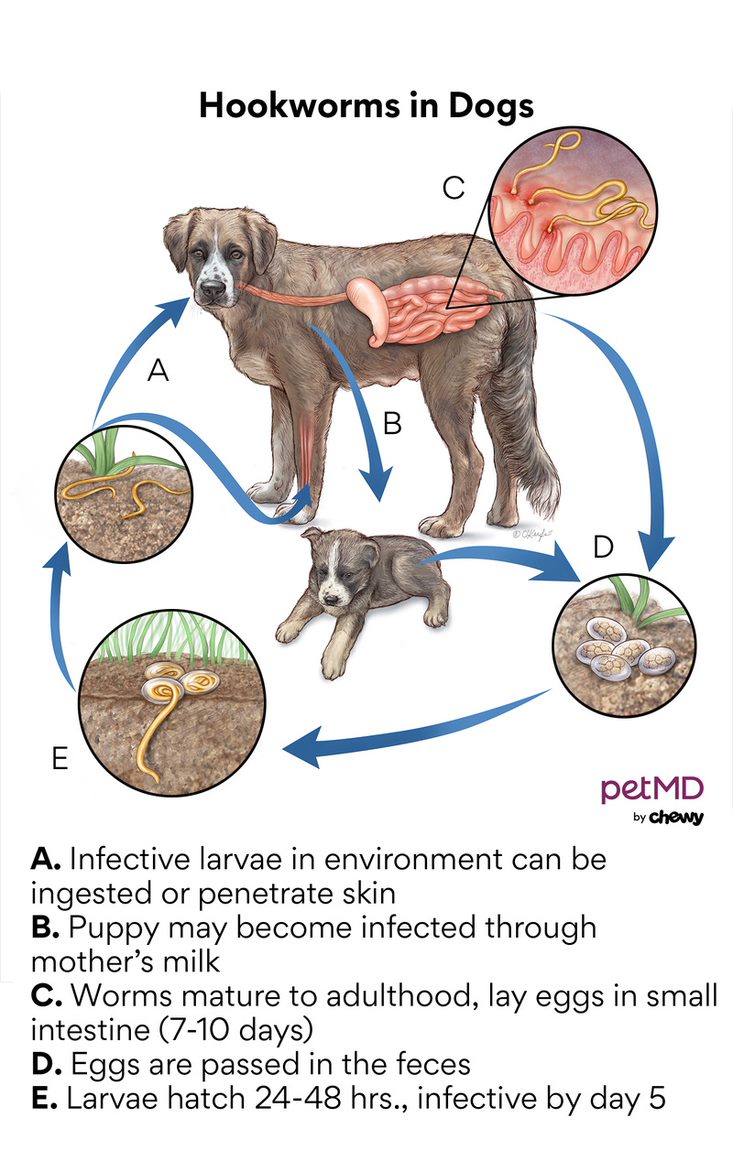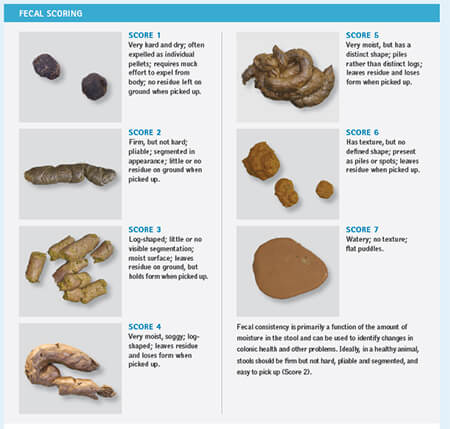To know if a dog has worms in its stomach, look for symptoms such as vomiting, diarrhea, weight loss, a swollen abdomen, increased appetite, coughing, lethargy, scooting, and visible signs of worms.

Credit: www.petmd.com
Symptoms Of Worms In Dogs
Symptoms of worms in dogs include vomiting, diarrhea, weight loss, a swollen abdomen, increased appetite, coughing, lethargy, scooting, and visible signs of worms in the feces or around the rectum. Severe infestations can lead to anemia, weakness, and changes in coat condition.
+A107
Vomiting
Vomiting is a common symptom of worms in dogs. If you notice your dog regularly throwing up or having episodes of unexplained nausea, it could be a sign of a worm infestation. It is important to consult your veterinarian to determine the underlying cause and receive appropriate treatment.
Diarrhea
Another symptom of worms in dogs is diarrhea. If your dog’s stool is loose, watery, or has blood or mucus in it, it may indicate a worm infection. Diarrhea can lead to dehydration, so make sure to provide your dog with plenty of fresh water and seek veterinary care if the diarrhea persists.
Weight Loss
Weight loss is a common symptom that can occur due to worm infestation in dogs. The worms consume the nutrients from the dog’s food, causing them to lose weight despite having a normal or increased appetite. If you notice your dog’s ribs or bones becoming more prominent, it is important to have them checked for worms.
Swollen Abdomen
A swollen or distended abdomen is another indicator of worm infestation in dogs. This can occur when there is a heavy infestation of worms in the intestines, causing their abdomen to appear bloated. If you notice your dog’s stomach looks abnormally large, it is essential to seek veterinary attention.
Increased Appetite
Contrary to weight loss, some dogs with worms may exhibit an increased appetite. This is because the worms are consuming the nutrients from the dog’s food, leaving them feeling hungry. If your dog is constantly begging for food or seems to be eating more than usual but still losing weight, worms could be the underlying cause.
Coughing
Coughing can be a sign of certain types of worms in dogs, such as lungworms or heartworms. If your dog has a persistent cough or wheezing, it is important to have them evaluated by a veterinarian to determine if worms are the cause.
Lethargy
Lethargy or excessive fatigue is a symptom that can occur with worm infestation in dogs. The worms deplete the dog’s energy and weaken their immune system, making them feel tired and lacking in energy. If your dog seems unusually lethargic or lacks interest in activities they usually enjoy, it is essential to have them examined for worms.
Scooting
Scooting or dragging their rear end on the ground can be a sign of worms affecting a dog’s anus. The worms may cause itching or irritation, leading the dog to relieve the discomfort by dragging their bottom along the floor. If you notice your dog engaging in excessive scooting, it is important to have their anal area checked for any signs of worms.
Visible Signs Of Worms
In some cases, you may actually see physical evidence of worms in your dog’s feces or around their rectum. This can include seeing actual worms in their stool, or noticing small white segments that resemble grains of rice around their anus. If you observe these visible signs of worms, it is crucial to take your dog to the veterinarian for proper diagnosis and treatment.

Credit: forevervets.com
Diagnosing And Treating Worms In Dogs
Is your dog showing symptoms like vomiting, diarrhea, weight loss, swollen abdomen, increased appetite, coughing, lethargy, or scooting? These could be signs of worms in their stomach. If you suspect your dog has worms, it is important to consult a veterinarian for proper diagnosis and treatment.
Testing For Worms At Home
If you suspect that your dog has worms, there are a few tests you can perform at home to help identify the presence of these parasites. One method is to visually examine your dog’s stool for any signs of worms. Different types of worms produce different visible signs, such as roundworms that resemble spaghetti or tapeworm segments that look like grains of rice.
An alternative method is to use a commercially available home testing kit. These kits typically involve collecting a small sample of your dog’s feces and using a solution to extract any worm eggs or larvae present. The kit will provide instructions on how to perform the test accurately and interpret the results.
Reactions Of Dogs With Worms
Dogs infected with worms can exhibit various reactions and symptoms. In large numbers, worms can cause anemia, leading to weakness, malaise, changes in appetite, and coat condition. Weight loss is also commonly observed. Severe infestations can even result in secondary conditions like pneumonia. Additionally, you may notice physical evidence of worms in your dog’s feces or around their rectum.
Prescribed Deworming Medication
If your dog is diagnosed with worms, your veterinarian will prescribe a suitable deworming medication based on the specific type of parasite. Different worms require different types of medication for effective treatment. Commonly prescribed deworming medications include Nemex 2, Panacur C Canine Dewormer, Elanco Tapeworm Dewormer, and Elanco Chewable Quad Dewormer.
Prevention And Long-term Care
Preventing worm infestations is crucial for your dog’s overall health and well-being. Ensure that your dog receives regular veterinary check-ups and follows a deworming schedule recommended by your vet. Keeping the environment clean and practicing good hygiene, such as regularly cleaning up your dog’s feces, can also help prevent worms.
Moreover, it’s important to maintain your dog’s overall health through proper nutrition and regular exercise. A strong immune system can better fend off worm infestations. Incorporating a monthly heartworm preventive medication, which often includes deworming properties, can provide added protection against some types of worms.
When it comes to your dog’s health, it’s crucial to stay vigilant and take the necessary steps to diagnose, treat, and prevent worms. By following these guidelines and working closely with your veterinarian, you can ensure that your furry friend remains healthy and worm-free.
:strip_icc()/common-canine-intestinal-parasites-1117426_final-7b48e1a58b5d4f3cac91d450b5eb7e8c.png)
Credit: www.thesprucepets.com
Frequently Asked Questions For How To Know If Dog Has Worms In Stomach
How Can I Test My Dog For Worms At Home?
To test your dog for worms at home, look for symptoms like vomiting, diarrhea, weight loss, a swollen abdomen, increased appetite, coughing, lethargy, scooting, or visible signs of worms in their feces or around their rectum. If your dog shows these signs, consult a veterinarian for proper diagnosis and treatment.
How Do Dogs React When They Have Worms?
Dogs with worms may experience vomiting, diarrhea, weight loss, a swollen abdomen, increased appetite, coughing, lethargy, and scooting. You may also see visible signs of worms in their feces or around their rectum. Severe infestations can lead to anemia, weakness, changes in appetite and coat condition, and even pneumonia.
Treatment with deworming medication is recommended by a veterinarian.
What Can I Do For My Dogs Worms In His Stomach?
If your dog has worms in his stomach, take him to a vet for a deworming medication prescription.
What Do Worms In Poop Look Like Dog?
Worms in dog poop can vary in appearance. Whipworms look like thread with one end enlarged. Roundworms resemble spaghetti and can be several inches long. Tapeworms are not usually visible in poop but their egg sacs, resembling grains of rice, may be found.
Conclusion
If you notice symptoms like vomiting, diarrhea, weight loss, or a swollen abdomen in your dog, it could indicate that they have worms in their stomach. Additionally, increased appetite, coughing, lethargy, and scooting are other signs to watch out for.
Severe infestations can lead to anemia, weakness, and changes in appetite and coat condition. It’s important to seek veterinary help and get your dog dewormed if necessary. Remember to regularly monitor your dog’s feces and rectal area for any physical evidence of worms.
Your veterinarian will prescribe the appropriate deworming medication for your dog’s specific parasite.



